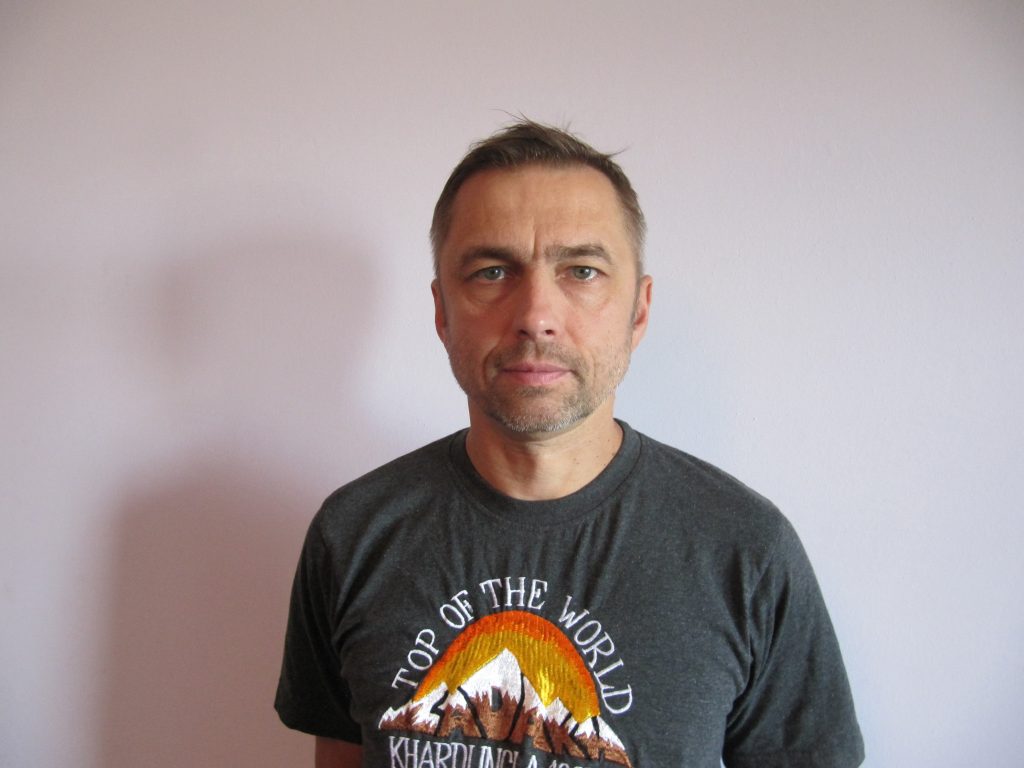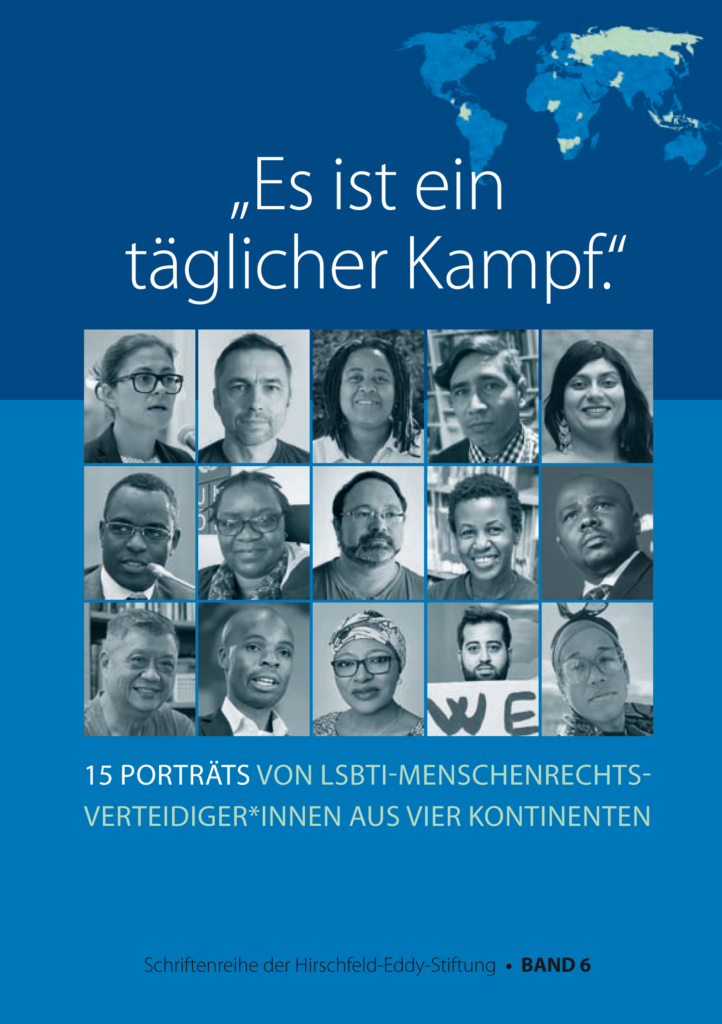Andriy Maymulakhin (52) is an LGBTI activist from Ukraine and founder of the LGBT Human Rights Nash Mir Center. In the 1990s he was one of the first activists in Ukraine to launch the gay and lesbian movement.
Translated from Hirschfeld Eddy Foundation series volume 6 “15 Portraits of LGBTIQ+ human rights defenders” (2021): download or order free of charge (in German) here.
“What I like most in life is freedom,” says Andriy Maymulakhin. “It means being able to travel, to see new places and different countries. It also means being an independent person, and expressing my opinions in any situation.” He recalls having felt that way as a child, although freedom was not always a given. Maymulakhin was born in Luhansk, a city in the Ukrainian Soviet Socialist Republic, in 1969. Article 121 of the Soviet penal code had prohibited “sexual relations between men” since the time of Stalin, or 1933 to be precise. Men who lived their homosexuality could be sentenced to five years in prison, and women were locked away in psychiatric clinics.
“For a long time I found it very difficult to understand my feelings,” he says. Even after recognizing a clear desire for men, he felt like the only gay person in the city. Luhansk, a center of heavy industry, had around half a million people in the 1970s and 80s. But lesbians and gay men were completely invisible.
Travel was always Maymulakhin’s path to freedom. When he was 6, his family spent a year in Bangladesh. His father was sent to the country as an interpreter when it gained its independence from Pakistan and the Soviet government was sponsoring various projects there. During that year Maymulakhin fell in love with a boy, and remembers the time as an absolute adventure. After returning to Luhansk he often sought refuge there in his thoughts. He was a dreamer.
Coming out and becoming an activist
His first sexual experience with a man was in London in the late 1980s. It was extremely difficult for Soviet citizens to travel to the West at the time, but Maymulakhin’s father was given the trip in return for his services to the Party. Knowing how much his son longed to travel, he let Maymulakhin go in his stead.
“On returning home I knew I’d have to fight in this life – for my nonconformity and for my personal and political freedoms”: that is how he summarized his insights from the trip in a subsequent essay. It would take a few more years to strengthen his identity. He found allies in both Ukraine and Russia, like his first boyfriend Sascha with whom he founded the first gay and lesbian group in Luhansk.
In 1991 Ukraine gained independence from the Soviet Union and in 1993 Maymulakhin came out to his parents in a letter that read, “Dear Mum and Dad, my life will be an adventure – I am gay!” Although article 121 which criminalized homosexuality had been revoked in Ukraine in 1991, mentalities did not change overnight. Maymulakhin’s parents reacted with concern and displeasure, but came to accept it over the years. “Now it’s not a problem for anyone close to me. My parents, my sisters and their husbands and children, and my neighbours are all okay with my sexuality. At least no one says anything rough to my face, and I don’t care what people say behind my back.” Among his most joyful experiences were his trips to the Crimea in the late 1990s. At that time he also felt free in his country – “it was pure joy!”
In 1997 he decided to found a gay and lesbian group. It was called Nash Mir (“our world”), and gave rise to the organization of the same name in 1999, which Maymulakhin leads to this day. For more than 20 years, Nash Mir has been one of the most important institutions for the LGBTI community and a source of information about bisexuality, homosexuality and gender identities in Ukraine. The initial funding in the late 1990s came from the embassy of the Netherlands. After accepting Maymulakhin’s application, embassy personnel handed him around 10,000 dollars in cash. “Can you imagine? I asked if they wanted to see my passport, but they said, ‘No, we trust you’.”
Since then Nash Mir has been funded by programs from the Netherlands, the USA, Canada, the European Union, Germany, Belgium, Great Britain, Norway, France, the OSCE, international foundations in Ukraine and sometimes by private sponsors.
Successes and desires
The situation for the LGBTI community in Ukraine has improved considerably since the 1990s. On the legal level, LGBTI people have been protected against workplace discrimination since 2015. Pride events have been held in Kyiv and some regional centers (Kharkiv, Odessa, Lviv) for the past six years. Around 7,000 people took part in the most recent Pride march in Kyiv in September 2021. A trans march is also held regularly in the Ukrainian capital.
“The Maidan revolution was an extremely important event for both my country and the queer community. I hope it signals a historical turn toward the European Union and European values. Change unfortunately takes a lot of time, but the main thing is that it’s happening and that the general vector will continue.” Despite numerous problems such as hate crimes and unequal rights for same-sex families, Ukraine is one of the post-Soviet countries to have made considerable progress in LGBTI matters, along with Lithuania, Latvia, Estonia and Georgia. Developments in Ukraine are especially promising when compared to the authoritarian tendencies in its neighbours Russia and Belarus.
Today Andriy Maymulakhin lives with his partner, whose name is also Andriy, in a house near Kyiv. They have been together for more than 10 years. In his free time Maymulakhin likes to hike with his dogs, cycle, garden and meet friends or colleagues downtown. He and his partner are awaiting a decision from the European Court of Human Rights. In 2014 the couple filed a lawsuit against the Ukrainian state because it does not recognize civil unions and thereby violates their rights. If a state loses this type of case, it has to pay compensation. “I very much hope that the judgement will prompt politicians in my country to pass better laws to make life easier for many couples.” Similar judgments have been issued in the past, for example against Italy in 2017.
Maymulakhin describes the annexation of Crimea as a trauma. Until the war with Russia, he went there every year to relax and “recharge my batteries”. It pains him deeply that he still cannot go there. Since 2014 his home city of Luhansk has also been under the de facto control of Russian and pro-Russian forces. Maymulakhin’s parents were living there when the war began, but he and his sisters helped them move to a place near Kyiv.
“I wish that Putin’s regime will fall and Russia will become a democratic state, that Crimea will return to Ukraine some day, and that I need not be afraid to go hiking there again. I would also like to stay young – for as we say in Ukraine, “It’s impossible to forbid people to dream”.
Inga Pylypchuk
15 Portraits of LGBTIQ+ Human Rights Defenders:
| Cesnabmihilo Dorothy Nuhu Aken’Owa Nigeria | Mauri Balanta Jaramillo Colombia | Ali Bousselmi Tunisia |
| Tash Dowell Zimbabwe | Irene Garoës Namibia | Jean Elie Gasana Rwanda |
| Julius Kaggwa Uganda | José Ignacio López Nicaragua | Andriy Maymulakhin Ukraine |
| Frank Mugisha Uganda | Dédé Oetomo Indonesia | Lilith Raza Pakistan/ Germany |
| Monica Tabengwa Botswana | Dragana Todorovic Serbia | Mikhail Tumasov Russia |
A publication by Hirschfeld Eddy Foundation as part of the project: LGBTIQ+ Human Rights Defenders. Find all events relating to this project here and all articles via the Tag MRV-2021 in this blog.




